
ECOLOGY AND SOCIETY
Scope & Guideline
Fostering interdisciplinary dialogue for a sustainable future.
Introduction
Aims and Scopes
- Social-Ecological Systems Research:
The journal emphasizes research on social-ecological systems, exploring the interdependencies between ecological and social dynamics, and how these relationships influence sustainability and resilience. - Interdisciplinary Approaches:
It promotes interdisciplinary methodologies that integrate ecological, social, economic, and cultural perspectives to address environmental issues and enhance governance frameworks. - Community Engagement and Local Knowledge:
A key focus is on the involvement of local communities and the incorporation of Indigenous and traditional knowledge in conservation and resource management efforts. - Resilience and Adaptation:
Research on resilience, adaptive capacity, and transformative change in response to environmental stressors, including climate change, is a central theme of the journal. - Policy and Governance:
The journal also highlights the importance of policy frameworks and governance structures that facilitate sustainable development and equitable resource management. - Biodiversity and Conservation:
It addresses issues related to biodiversity conservation, ecosystem services, and the impacts of human activities on ecological integrity.
Trending and Emerging
- Climate Change Adaptation:
There is a significant increase in research focused on strategies for climate change adaptation, highlighting the need for resilient social-ecological systems that can withstand environmental stressors. - Social Justice and Equity in Conservation:
Emerging themes include a focus on social justice, equity, and the need to address power dynamics in conservation efforts, ensuring that marginalized voices are heard and included in decision-making processes. - Participatory and Community-Based Approaches:
Research increasingly emphasizes participatory approaches and community engagement in environmental governance, recognizing the importance of local knowledge and collective action. - Technology and Innovation in Resource Management:
The integration of technology, such as remote sensing and social media, in resource management and conservation practices is becoming more prevalent, reflecting a trend towards innovative solutions. - Ecosystem Services Valuation:
There is a growing interest in the valuation of ecosystem services, emphasizing the need to understand and quantify the benefits that ecosystems provide to human well-being. - Transdisciplinary Research:
The journal is seeing a rise in transdisciplinary research that seeks to bridge the gap between academic research and practical applications, fostering collaboration across various fields and sectors.
Declining or Waning
- Traditional Conservation Approaches:
There is a noticeable decline in papers focusing solely on traditional conservation methods, as the journal shifts towards more integrative and participatory frameworks that involve local communities and Indigenous practices. - Single-Disciplinary Research:
The journal has moved away from research that solely focuses on one discipline, such as pure ecological studies, in favor of interdisciplinary studies that combine social sciences with ecological research. - Top-Down Governance Models:
Research centered around top-down governance models is less prevalent, indicating a shift toward more collaborative and participatory governance approaches that empower local stakeholders. - Static Ecological Assessments:
There seems to be a decreasing emphasis on static assessments of ecological conditions, with more focus now on dynamic, adaptive management strategies that account for changing environmental conditions.
Similar Journals
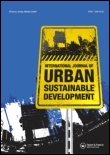
International Journal of Urban Sustainable Development
Fostering collaboration for impactful urban development.The International Journal of Urban Sustainable Development is a premier peer-reviewed journal published by Taylor & Francis Ltd, dedicated to advancing knowledge in the field of urban sustainability. With an ISSN of 1946-3138 and an E-ISSN of 1946-3146, this journal has gained recognition for its high-quality research, attaining Q1 status in multiple categories including Development, Geography, Planning and Development, and Urban Studies, per the 2023 category quartiles. Open Access since 2022, the journal ensures that groundbreaking research is widely accessible to scholars, practitioners, and policy-makers alike, enhancing its reach and impact. Operating from the United Kingdom, it focuses on a diverse array of topics related to urban environments and sustainable practices, supporting innovation and policy development. As a result, the journal holds significant placements in Scopus rankings, notably ranking #62 in Urban Studies, underscoring its pivotal role in shaping the future of sustainable urban development globally.
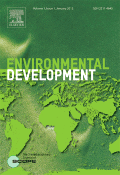
Environmental Development
Exploring the intersection of geography, planning, and environmental science.Environmental Development is a premier academic journal published by Elsevier, dedicated to advancing the field of environmental science through interdisciplinary research and innovative practices. With a focus on geography, planning, and development, as well as management, monitoring, policy, and law, this journal provides a rigorous platform for scholars and practitioners to share insights that shape sustainable environmental policy and practice. Holding a prestigious Q1 ranking in both relevant categories and boasting impressive Scopus rankings - 62 out of 821 in Geography and 60 out of 399 in Environmental Science - Environmental Development stands out as a critical resource for those invested in the future of our planet. The journal emphasizes impactful research that addresses contemporary challenges, fostering dialogue across disciplines and geographical boundaries. With a commitment to high-quality research, it offers an important outlet for those aiming to influence environmental policy and developmental strategies globally. Join the growing community of researchers, professionals, and students engaged in promoting sustainable environmental practices through the knowledge shared in this esteemed publication.

Ecological Indicators
Advancing ecological knowledge for a sustainable future.Ecological Indicators, published by Elsevier, is a prestigious journal dedicated to advancing the fields of ecology and environmental science. With an impressive impact factor and ranked in the Q1 quartile for both Ecology and Decision Sciences categories, the journal serves as a vital resource for researchers and professionals aiming to apply ecological knowledge to real-world problems. The journal covers a broad scope of topics within ecological indicators, aiming to provide comprehensive insights into biodiversity, ecosystem health, and sustainability metrics. Founded in 2001 and continuing through 2024, Ecological Indicators has established itself as a leader in disseminating significant research and innovative findings. The journal's standing is reflected in its remarkable Scopus ranks, placing it among the top percentile in its respective categories. Authors are encouraged to submit their work to share vital findings with an engaged audience of researchers, professionals, and dedicated students, ensuring the continued relevance and impact of ecological research on global environmental policies and practices.
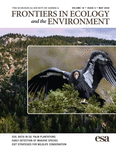
FRONTIERS IN ECOLOGY AND THE ENVIRONMENT
Elevating ecological discourse through rigorous research.FRONTIERS IN ECOLOGY AND THE ENVIRONMENT, a prestigious journal published by Wiley, serves as a leading platform for disseminating high-quality research in the dynamic fields of ecology, evolution, and environmental science. With an impressive impact factor and ranked in the top tier (Q1) across multiple categories, including Ecology and Ecology, Evolution, Behavior and Systematics, this journal holds an esteemed position in the scholarly community, reflecting its rigorous peer-review process and the significance of its contributions. Boasting a Scopus rank of #11 out of 721 in its primary category and #10 out of 461 in Environmental Science, this journal is at the forefront of ecological research and influences future developments in the field. As an open-access journal, it seeks to promote the widest possible dissemination of research findings, allowing researchers, professionals, and students in the field of ecology and environmental science to stay informed and engaged with the latest advancements from 2003 through to 2024. Located in Hoboken, New Jersey, the journal invites submissions that traverse theoretical and practical aspects of ecology, facilitating collaborative efforts to address pressing environmental challenges.
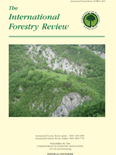
INTERNATIONAL FORESTRY REVIEW
Connecting Research and Practice in Forest ManagementINTERNATIONAL FORESTRY REVIEW, published by the Commonwealth Forestry Association, stands as a vital resource for researchers, professionals, and students in the fields of ecology, forestry, and environmental science. With an ISSN of 1465-5489 and a robust E-ISSN of 2053-7778, this journal has been disseminating impactful research since its inception in 1999, and continues to do so into 2024. The journal enjoys a prominent Q2 ranking across multiple categories in 2023, including Ecology, Forestry, and Geography, Planning and Development, reflecting its significance in the scholarly community. Although it operates on a traditional access model, the content published is pivotal for advancing knowledge and addressing pressing issues in forest management and sustainability. Situated in the United Kingdom, the journal aims to provide a multidisciplinary platform that encourages collaboration among researchers and practitioners, ultimately fostering sustainable forestry practices worldwide.

Environments
Transforming Environmental Science into ActionEnvironments is a distinguished international journal published by MDPI, focusing on the interdisciplinary realm of ecology, environmental sciences, and sustainability. Established in 2014, this Open Access journal allows unrestricted access to its high-quality research articles, making it an essential resource for researchers, professionals, and students alike. With its impact factor and Scopus ranks reflecting its academic significance—including a Q1 ranking in Ecology, Evolution, Behavior and Systematics—Environments serves as a critical platform for the dissemination of innovative research and practical applications in addressing pressing environmental challenges. The journal's commitment to promoting sustainability and renewable energy initiatives aligns with global efforts to foster a better understanding of our ecological systems and enhances its relevance in today’s rapidly evolving environmental landscape. The journal is based in Switzerland and encompasses a broad scope dedicated to advancing scholarly dialogue in environments related to ecological and environmental science.
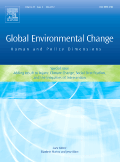
GLOBAL ENVIRONMENTAL CHANGE-HUMAN AND POLICY DIMENSIONS
Exploring the Nexus of Humanity and NatureGLOBAL ENVIRONMENTAL CHANGE-HUMAN AND POLICY DIMENSIONS is a premier academic journal published by Elsevier Science Ltd, based in the United Kingdom. With a significant focus on the interplay between human activities and environmental change, this journal serves as a critical platform for researchers and policymakers alike. It boasts an impressive impact factor and ranks in the top quartile (Q1) across multiple categories, including Ecology, Geography, and Environmental Science, reflecting its high relevance and influence within the respective fields. The journal provides insightful analyses and empirical studies from 1990 to 2024, fostering a deeper understanding of the socio-political dimensions of global environmental issues. Although it does not offer open access options, readers can still access the journal through various university libraries and institutional subscriptions, ensuring wide dissemination of important research findings. With its dedication to promoting interdisciplinary dialogue and evidence-based policy development, GLOBAL ENVIRONMENTAL CHANGE remains an invaluable resource for academics, practitioners, and students committed to addressing pressing environmental challenges.

ENVIRONMENTAL MANAGEMENT
Connecting research and policy for a greener future.ENVIRONMENTAL MANAGEMENT, published by Springer, stands at the forefront of advancing sustainability and ecological stewardship in the fields of Ecology, Global and Planetary Change, and Pollution. With an impressive tracking history from 1977 to 2024 and prestigious quartile rankings reflecting its significant impact (Q1 in Ecology and Q2 in both Global and Planetary Change and Pollution), this journal engages a wide range of stakeholders, including researchers, policymakers, and environmental professionals. The journal is a vital resource for those dedicated to addressing pressing global environmental challenges, publishing rigorous interdisciplinary research that informs policy and practice. While it does not offer open access, its content remains accessible through institutional subscriptions. Located in the heart of New York, ENVIRONMENTAL MANAGEMENT is dedicated to fostering a substantive dialogue on innovative approaches to environmental preservation and management.

Conservation Science and Practice
Leading the charge in transformative environmental research.Conservation Science and Practice, published by WILEY, is a leading open access journal dedicated to advancing research and practice within the fields of ecology, environmental science, and conservation. Since its inception in 2019, this prestigious journal has quickly established itself as a vital resource for scholars and practitioners alike, holding impressive Quartile rankings in Ecology (Q1), Environmental Science (miscellaneous) (Q1), Global and Planetary Change (Q2), and Nature and Landscape Conservation (Q1) as of 2023. With a strong commitment to disseminating high-quality, peer-reviewed research, it serves as a platform for innovative solutions to the complex challenges faced in conservation today. The journal is accessible to a global audience, promoting the dissemination of critical findings that inform policy and practice in diverse settings. Researchers, professionals, and students looking to stay at the forefront of conservation science will find invaluable insights and developments within its pages. Join the conversation in shaping sustainable futures through cutting-edge research in Conservation Science and Practice.
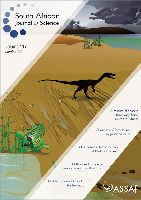
SOUTH AFRICAN JOURNAL OF SCIENCE
Pioneering Science from the Heart of AfricaThe SOUTH AFRICAN JOURNAL OF SCIENCE, published by the Academy of Science of South Africa (ASSAf), is a prestigious open-access journal dedicated to the advancement and dissemination of scientific knowledge across various disciplines. Since its inception in 1973, the journal has played a pivotal role in fostering scientific communication within South Africa and beyond, ranking in the Q2 and Q3 quartiles across critical categories such as Agricultural and Biological Sciences, Biochemistry, Genetics and Molecular Biology, and Earth and Planetary Sciences as of 2023. With an ISSN of 0038-2353 and E-ISSN 1996-7489, this journal embraces modern publishing practices, having adopted an open-access model in 2009, which ensures that research is readily accessible to a global audience. The journal aims to promote interdisciplinary research and facilitate collaboration among scientists, making it an essential resource for researchers, professionals, and students eager to contribute to and learn from the dynamic landscape of scientific inquiry. For further information, collaborators and correspondents may reach out to the journal through its contact address: PO BOX 72135, LYNWOOD RIDGE 0040, SOUTH AFRICA.